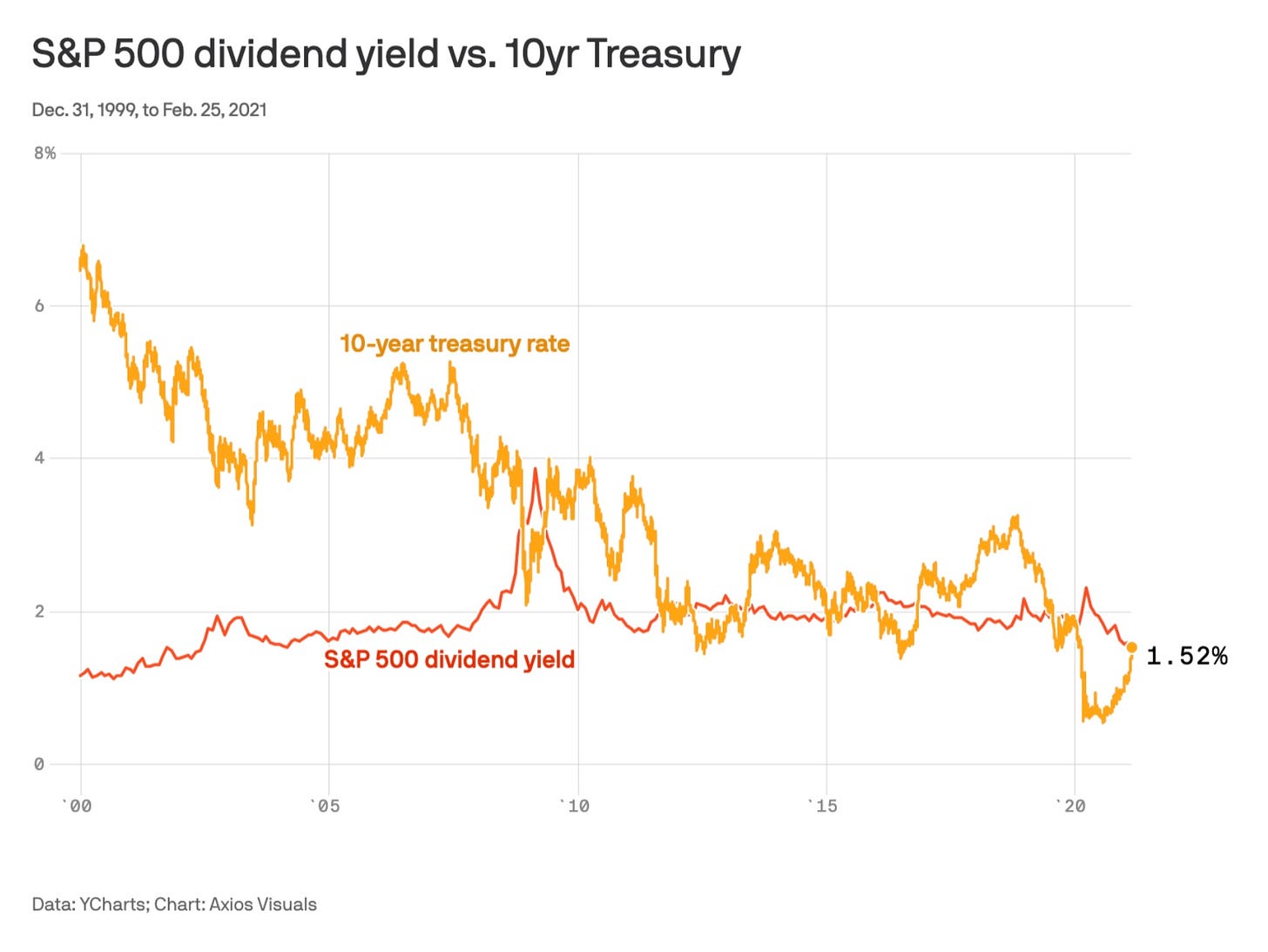📝 Market Commentary for 2021-Q1
This quarter, we focus on the interest rate rise and implications for assets.
We conduct extensive investment research and comment on the most significant market events in the past quarter.
Do not reply to this email with any service requests, contact us for support if needed.
Interest Rates Rise Significantly in Q1 2021 on Inflationary Concerns.
(Conscious Capital Advisors)
The most important investment-related story for Q1 2021 was the notable shift in the trajectory of interest rates. During the first quarter, rates on the 10-year rose from 0.93% to 1.74%, marking an 87% increase - the largest seen since 2016. Interest rates are an essential part of the economic cycle because they determine the cost of the money lent to consumers and businesses alike. The reason why this is important is because an uncontrolled rise in interest rates could impact the credit cycle and possibly cause a recession as retail and corporate spending shrinks.
Our previous commentary noted the extraordinary actions of the Federal government and Federal Reserve in response to the global COVID-19 pandemic. The coordination of fiscal and monetary policies has created an increase in inflationary expectations, which the bond market is pricing in. This viewpoint has been corroborated by the increases in commodities as well. Bonds and other income assets generally decline in value as inflation expectations increase.
The Federal Reserve, who is responsible for maintaining price stability and full employment of the United States, believes there is little reason to worry about these forces that could potentially erode the buying power of Americans. “If we see [inflation] moving persistently and materially above levels we are comfortable with, then we would react to that,” stated Fed Chairman, Jerome Powell.
Rising Rates on Have Shifted the Performance of Certain Equities.
(Conscious Capital Advisors)
Although a rising rate environment creates the most significant challenges for fixed income investors, equity investors are also greatly impacted, albeit in a less direct manner.
The first issue that challenges equity markets is opportunity cost. In another past note, we previously noted that investors, particularly those seeking income, had few alternatives within the public investment universe. While bond yields remained below the dividend yield of the equity market, investing in stocks and taking equity risk exposure could be justified for income-seeking investors. However, as the spread between the 10-year Treasury bond yield and S&P 500 dividend yield closes as a function of rising rates, exposure to equity risk becomes a much more difficult proposition. Furthermore, the equity risk premium, which is the excess return earned by an investor when they invest in stocks over a guaranteed return, also narrows during a rising rate environment unless earnings grow at a faster rate.
The second issue for equity markets is one of duration. In the fixed-income markets, duration risk is a concept that most investors in the space understand. When interest rates rise, bonds that are held also decline in value. However, what is less known is that specific equities can carry duration risk as well. Abstractly, duration refers to the length of time it will take for investors to get back the money they have invested. Therefore, newer companies with less stable profits would have longer durations than companies with more established cash flows. This phenomenon is the principal reason why the stodgier companies of the Dow Jones Industrials have handily outperformed those of the tech-heavy NASDAQ Composite during the 1st quarter of 2021. Should interest rates continue to rise, it is highly probable that this trend would continue. Since the S&P 500 is now heavily weighted toward technology companies, as we noted previously, a sizable depreciation in these firms would drag down the entire index.
Written by Joseph Lu, CFA®
Joseph has over a decade of experience as an investment professional, primarily in quantitative analysis and portfolio management roles. He is the founder and managing director of Conscious Capital Advisors and a CFA® Charterholder. The CFA charter is a globally respected, graduate-level investment credential by the CFA Institute, a global association of more than 90,000 investment professionals working in over 133 countries.
🔗 Connect with us on LinkedIn, Facebook, or Twitter.
Have a question about what we shared? Email us at info@consciouscapital.pro.
Do not reply to this email with any service requests, contact us for support if needed.
The information presented in this newsletter is for educational purposes only and is not a solicitation or recommendation for any specific security, product, service, or investment strategy.
Investments involve risk and unless otherwise stated, are not guaranteed. Be sure to consult with a qualified financial advisor, tax professional, or attorney before implementing any strategy or recommendation you may read here.






